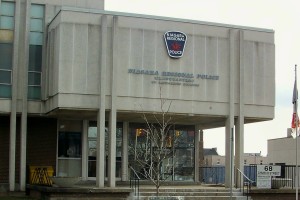‘Exhausted’ tax base can’t afford arbitration awards: Timms
Niagara This Week - St. Catharines
NIAGARA — Bruce Timms thinks the time has come for the Region to begin assembling a war chest to prepare for future legal fights over the cost of policing in the region.
The St. Catharines regional councillor, who has long been a critic of generous settlements awarded to public sector employees such as police officers by non-elected, provincial arbitrators, is pushing for the creation of a new reserve fund to prepare for legal battles before the Ontario Civilian Police Commission.
The commission acts as a referee when police services and the municipalities that fund them can’t agree on what the funding levels should be. The commission can impose police budget approvals on local governments.
In the past, it was common for the Region — which funds Niagara Regional Police — to butt heads with the Niagara Regional Police board over police spending that now accounts for about half of the Region’s budget.
But the Region has backed down after threats of appeals to the commission, which can actually award a budget to a police service that’s even higher than what’s being requested, the way provincial arbitrators can in contract disputes between municipal governments and fire departments.
Timms said by refusing to stand its ground, the Region puts the NRP board in a weak position at the bargaining table because the association representing police officers knows the Region will blink when push comes to shove.
“Everybody knows the Region won’t fight,” he said.
That’s in part due to the hefty legal costs associated with a police commission appeal, because the Region would end up paying legal costs for both sides, said Timms. But it’s also because the commission is seen as a board that almost always rules in favour of police services arguing they need the cost increases to maintain adequate police services, he said.
“That’s what seeds the whole attitude of some council members that it’s a waste of time defend our position at an (police commission) appeal,” he said. “That argument has won the day in Niagara for 20 or 25 years.”
The NRP board says more than 90 per cent of its costs are tied directly to wages and benefits.
In 2013, a provincial arbitrator awarded NRP police officers a 3.05 per cent pay raise, retroactive to January of 2012. That, plus a negotiated contract between the NRP board and the police association that will see police officers get pay raises of 2.6 per cent, 2.5 per cent and 2.5 per cent over a three-year period, pushed policing costs up by millions of dollars.
Timms brought a motion to regional council on July 3, asking the Region to put $200,000 a year into a police commission appeal reserve fund, to give the NRP board leverage at the bargaining table.
He called the arbitration process “broken” and said it’s stacked against the property taxpayer, noting awards given to one class of public sector workers such as police can be carried over to contracts with other public sector workers such as firefighters, paramedics and nurses.
Regional Chair Gary Burroughs noted the 3.05 per cent Niagara police raise was based on the fact that firefighters got the same raise.
The reserve fund is needed to send a message to the NRP board, to the police association and to arbitrators that Niagara taxpayers are being bled dry, said Timms.
“I simply don’t believe the Niagara taxpayer has the ability to pay more,” he said. “We have an exhausted tax base.”
Timms, whose motion at council was referred to the Region’s corporate services committee meeting next week, said the war chest could also influence arbitration awards because it will signal the Region is serious about taxpayers’ ability to pay, and that police services may have to be reduced if the Region wins at a police commission appeal.

